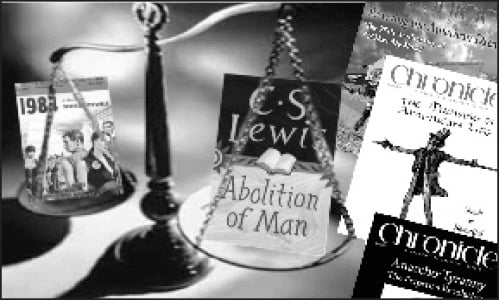“Transcend yourself and join in the universal struggle
to bring about the self-transcendence of all men!”
—Karl Marx
Culture, as the term is used in America in our times, covers a vast territory with ill-defined frontiers. There is primitive culture (flint spearheads, animal and human sacrifice). There is high culture (Shakespeare, Michelangelo). There is, or used to be, folk culture (“country music” before its commodification). There is a lowbrow culture (rap music, fraternity hazing, George W. Bush’s oratory), and a middlebrow culture (Disney movies, the writings of William F. Buckley, Jr.). There is even a faux primitive culture surrounding the production and consumption of rock music. As always, it does us well to look at the origin of words. In this case, the origin is Latin, and, in early usage, the word was associated with cult, i.e., religion, and agriculture—religion and agriculture being the deeply intertwined and indispensable bases of civilization.
Nevertheless, in general public discourse, we know what we mean when we speak of “culture” without specificity. We mean the sum of material, social, instrumental, linguistic, and spiritual ideas, assumptions, customs, beliefs, values, tools, and behaviors that constitute a human community. A person without culture, in this sense, if such were possible, would scarcely be human. When we speak of the “culture war,” we are postulating that we are in possession of a culture against which war is being made. We refer to a readily observable phenomenon—the relentless pounding that the American social fabric has endured for a half-century or more from many of its members who wish to dissolve and transform it. If the defenders of American culture are to have any success, we have to be brutally frank with ourselves. The culture war is very much a civil war. The enemy is not at the gates; he is well ensconced in our temples and even makes himself free of our firesides.
We should always remember that the struggle is the “culture war” and not, as is sometimes said, the “culture wars.” One reason the defenders of culture have had so little success is that we have been fighting a series of brushfire skirmishes instead of a war. The enemy is Legion, but he is also One. One of the enemy’s most devastating and uncounterable weapons is the federal judiciary. False allies tell us we will win a victory by changing a few Supreme Court justices. This tactic is so plausible-sounding and so foolishly ineffective that it could only have been thought up by a politician. The real battle we need to arm ourselves for is the extinction of the usurpative, unconstitutional tyranny of judges over our life and culture—that is, we need to rid ourselves of craven obedience to evil and irresponsible power in high places.
The culture war is not of our choosing. We did not seek it or declare it. We really only wanted to be left alone to live by our patrimony in the normal human way. Many of us are even reluctant to admit that it is a concerted aggression and not just a series of accidental collisions. So we have been retreating steadily, and many of our troops have been routed or gone over to the enemy.
Perhaps we should remind ourselves of what we ought to be defending: a culture, which is the sum of the life of a community and which contains all that is human. Its most important parts are the most intangible. What is threatened with destruction is the American form (however attenuated) of the substantive and positive side of what was once called Western civilization.
That culture reflects a vision of the nature of man and of his place in the universe without which we will cease to exist in any meaningful sense. C.S. Lewis laid out the whole question inimitably in The Abolition of Man. The vision is of man as an earthly creature, yet made in the image of something Higher, each of us unique, with a divine spark and a free will. We are to be guided by reason (not rationalism), exercised in the light of transcendent values that we possess through Revelation, the wisdom of the ages, and an apprehension of our own true nature (of which Thomas Fleming has been at great pains to remind us). The alternative, ultimately, is a cultureless world in which the divine spark, the free will, and the wisdom of the ages have been repudiated and man has been reduced to a paltry creature of momentary appetites. If we lose, then the destructive and negative underside of Western civilization (so well displayed by Orwell in 1984) will have won a total victory.
Examples of the triumph of the underside are myriad in every aspect of our lives. To take just one: The biblical Ten Commandments are the fount of all our law, both in spirit and in historical fact. They embody wisdom, good faith, good will, and divine command. But the tyrants in black robes have dredged up from the alchemical underside of our culture a fiction that postulates the source of law as man-made theory. And they have ordered that their fiction must be kept free of the taint of “religion,” the true source of our law.
Chronicles has been fighting the enemy of culture with skill and persistence—and, yes, courage—for three decades now. No eyes have been more acute in spying out the enemy who pretends to be a friend. The fight has been against long odds. Will our outnumbered and out-supplied company suffer the fate of the Old Guard at Waterloo? Or will we finally win through against the odds, like Washington and his rebels? In any case, there is no better cause to which to pledge ourselves. I expect that Chronicles will keep up the fight for a long time to come, and that we will continue to relish the joy of battle, with good comrades in a good cause.

Leave a Reply